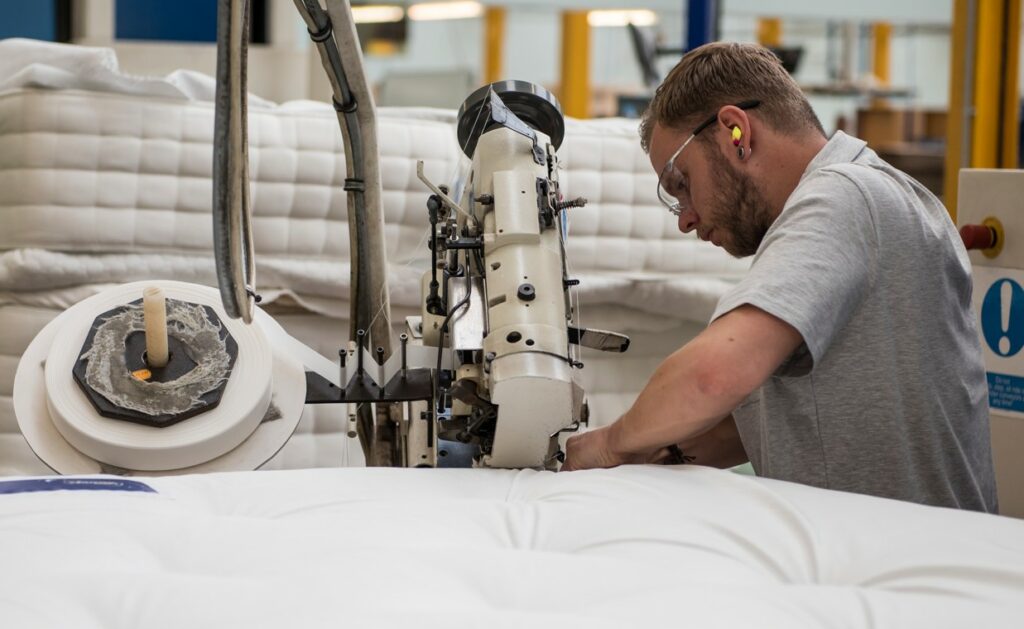Angela Moran, ESG Director at Silentnight, talks about collaborations and how they can drive a more sustainable future.

Last month was National Bed Month – our annual reminder of the critical role a good bed plays, not only in our sleep but in our overall health and wellbeing. As the UK’s most trusted sleep brand, ensuring our colleagues, customers and communities are getting a good night’s sleep is vital.
In fact, our advocacy for sleep goes beyond our beds and mattresses and makes up a key aspect of our social ESG commitments. Through strong sector-wide partnerships, we’ve truly been able to place sleep at the forefront of everything we do. These partnerships have also enabled us to go that one step further with our sustainability commitments.
At Silentnight, we recognise that the magnitude of today’s problems requires ‘joined-up’ thinking. We work with an expansive network of stakeholders – from customers, suppliers, NGOs and trade associations– to ensure that we are all aligned, well-informed, and committed to achieving our ESG goals.
The path to a more sustainable future isn’t a competition, it’s a collective effort. Our partnerships have allowed us to integrate sustainable practices across our operations while influencing sector-wide change.
Partnering with trade associations for industry progress
One of the most effective ways businesses can contribute to a more sustainable future is by working with trade associations. Our collaboration with the National Bed Federation (NBF) is a prime example.
By engaging in initiatives such as the NBF Ecodesign Principles guide, we are helping to embed sustainability into product design industry wide, while sitting on the NBF’s circular economy committee ensures we play a role in shaping policies that promote responsible manufacturing.
We encourage other companies to look for similar opportunities. Partnering with regulatory bodies, standards organisations, or trade groups can help businesses stay ahead of policy changes, contribute to industry best practices, and drive impactful change beyond their own operations.
Driving sector-wide change through research and advocacy
Beyond trade associations, we also collaborate with academic institutions and government programs to influence broader industry shifts.
Our work with the fire chemistry team at University of Central Lancashire demonstrates how scientific research can be used to advocate for regulatory improvements and our participation in the UK government’s Energy Savings Opportunities Scheme (ESOS) further shows how businesses can identify and implement practical solutions for reducing environmental impact.
By leveraging research and evidence-based advocacy, we can not only improve our own sustainability but also influence broader industry transformation.
Charity partnerships
In addition to driving change across the industry, collaboration also allows us to give back to our communities. Whether through financial contributions, in-kind donations, volunteering, or using our platform to raise awareness for important causes, we strive to make a meaningful and lasting impact.
We collaborate with organisations and charities that understand the importance of good sleep and work to improve the health and prospects of children and young people impacted by socio-economic challenges.
One such partnership is with Zarach, a national charity committed to helping vulnerable children and families living in poverty by providing a good bed, and as a result, a good night’s sleep.
Locally, we have also proudly sponsored the Barnoldswick Town Football Club and supported various grassroots sporting programmes, fostering community engagement and encouraging active lifestyles.
Pendleside Hospice also benefits from our donations, which help to fund specialist palliative and end-of-life care for patients and families.
Nationally, we also collaborate with the Furniture Makers’ Company, a charity that provides apprenticeship training and assists individuals who have served the furniture industry but have fallen on hard times.
Whether through financial contributions, volunteering, or product donations, these collaborations create meaningful impact while reinforcing corporate social responsibility.
Building a culture of collaboration within our business
Collaboration should start from within. By embracing collaboration within the business, we’ve been able to implement effective ESG initiatives. One such initiative is our dynamic Strategy Deployment Process. Instead of establishing a formal ESG Committee, we’ve created targeted strategy groups that tackle different priorities, from charity outreach and waste reduction to achieving Net Zero goals.
By empowering our colleagues and encouraging cross-departmental collaboration, we can ensure that our ESG commitments are effectively implemented and continuously improved upon.
The challenges we face today, from climate change to social inequality, are too great for any one company to tackle alone. By working together with industry peers, trade associations, academic institutions, and community groups, we can drive real change and build a more sustainable future.














